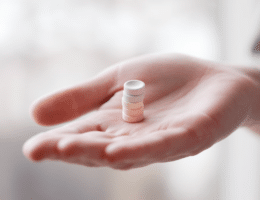A healthy microbiome has been the subject of many recent research studies and for a good reason. The activity of trillions of microbes that make up the human gut microbiome has been linked to improved overall health.
These effects span from aiding you in digesting food, affecting your mental health and moods, and helping you build a stronger immune system.
But there’s more: researchers have linked the activity of good gut bacteria, a diverse microbiome, and more to increased longevity and healthy aging quality.
These include faster walking speeds, lower cholesterol levels, and higher levels of beneficial blood chemicals. [1]
Therefore, it isn’t surprising that studying a healthy microbiome is evolving into a scientific field.
The good news is that we can influence which bacteria live in our gut. That said, below are some easy research-based tips on how to improve your gut health naturally.
But first, let’s get into the meat of a healthy microbiome.
What Is a Diverse (Healthy) Gut Microbiome?
As mentioned above, an intestinal microbiome (otherwise called intestinal microbiota) comprises a community of microorganisms, mainly bacteria (both healthy and harmful). Scientists still haven’t accurately described what makes a healthy gut microbiome. What they do know, though, is that the more diverse your microbiome is, the healthier it is.
Moreover, scientific evidence suggests that a diverse community of gut microbes can make our gut microbiome more resilient against pathogens. [2]
Let’s examine the criteria determining a diverse microbiome to understand this fully.
| What Is a Diverse Microbiome? | |
| Richness | Refers to the total number of bacterial species in a human gut microbiome. |
| Diversity | Refers to the individual bacterial count coming from each bacterial species. |
Conversely, if the balance of your gut bacteria is off, your body becomes prone to inflammation. That said, before we start exploring the ins and outs of how to restore gut health, it’s vital to understand how inflammation works.
Inflammation And Gut Health
Newer research studies have identified intestinal inflammation as a possible culprit of many modern-day illnesses. Weight gain, insulin resistance, autoimmune diseases, and depression are included.
Current data suggests chronic gut inflammation can be caused by the imbalance of harmful and healthy bacteria—the so-called dysbiosis. [3]
Dysbiosis can also cause many GI and non-GI-related diseases, such as irritable bowel syndrome (IBS), Crohn’s disease, diabetes, cancer, and cardiovascular disease.
With that in mind, let’s consider bringing your body back to balance. You can do plenty of things to restore the balance of your intestinal bacteria and improve your gut health naturally. Below we break down simple lifestyle changes you can easily implement.
How To Hit the Sweet Spot With Your Gut Bacteria
1. Take Probiotics and Eat Fermented Foods
When you think of reestablishing a healthy gut microbiota, probiotics are the first thing that come to mind.
The thing is, you might have already used them to combat dysbiosis that manifested in either gas, constipation, or diarrhea-related problems.
Adding good bacteria to colonize your gut at the expense of harmful bacteria is always a good idea—either in probiotic supplements or probiotic foods (more on those later).
According to the Harvard Medical School, probiotics are healthy gut bacteria that can be used to diversify your microbiome. Doctors use it mainly as an established protocol for treating antibiotic-use-related dysbiosis. [4]
When taken in the form of fermented foods, you can double up on the health benefits of probiotics, given that you get to benefit from both the nutrient-dense plant foods (like soybeans, cabbage, and tea) used in the process of fermentation and the so-called commensal microbes, which are produced during the process.
According to data published in the Cell Journal, a high-fermented-foods diet supports digestive health. Participants who took an average of 6.3 servings per day of fermented foods for 10 weeks experienced improved microbiome diversity. [5]
Below are some ideas to get you started if you want to up your counts of beneficial bacteria through diet:
- Miso
- Kimchi
- Yogurt
- Kefir
- Tempeh
- Kombucha
- Sauerkraut
2. Include a Variety of Different Foods In Your Diet
Another way to boost the amount of your healthy gut bacteria is via a diverse diet. The rule of thumb is to keep your plate colorful. It’s simple, mix and match different-colored plant foods at each food serving.
The problem is most of us living in the Western hemisphere can’t boast about eating a balanced, diverse diet. Aiming for more diversity? You can never go wrong with a Mediterranean diet. The thing with the Mediterranean diet is that it includes a variety of plants and oils rich in fiber and polyphenols. These, in turn, create a favorable environment for good gut microbes to thrive.
Some research supports the health claims linked to eating Mediterranean. Yes, you guessed that right; people following this diet have been found to have a more varied gut microbiome. [6]
3. Get In On Some Exercise
Furthermore, people who want to improve their gut health should look beyond their diet. You may call them high-maintenance, but if you want to keep the bugs in your gut happy, you may need to do more in the way of lifestyle changes.
According to the British Heart Foundation, exercise can positively affect your microbiome. [7] Scientists are not yet clear on how exercise promotes gut health, but there are some speculations about it.
“It could be that exercise changes the rate at which material moves through the intestines. Or perhaps exercise reduces inflammation in the gut. Or exercise might alter our appetite, and alter the way that our bodies process the food we eat. All of these could affect the microbiome environment.” Source: Harvard Health Publishing
If you like the idea of exercising, you can start slow and include a healthy dose of daily exercise by trying cycling, walking, hiking, or swimming.
4. Keep Your Stress Levels Down
The link between stress and intestinal health is intriguing for scientists and mind-blowing for people. Yet, dysbiosis caused by stress often manifests in less admirable forms, such as a stomach upset before an exam day or digestive problems amid a major project at work. So, no, it’s not only in your head.
Research has found that stress levels can disrupt the function of your microbiome. But how does this work? This may be due to the interplay of the complex gut microbiota ecosystem and the vagus nerve—the most widely distributed nerve in the human body.
Current findings suggest that high-stress levels can inhibit the vagus nerve and have pro-inflammatory effects on the gut. [8]
Having said that, it won’t hurt to have a few stress management techniques at hand if need be. Consider deep breathing, meditation, and mindfulness techniques.
5. Improve Your Sleep Routine
Yes, even your sleep patterns can affect the health of your gut microbiota. Scientists have looked into how sleep deprivation can impact your gut health, and it turns out it can do this in more ways than one. [9]
- Sleep deprivation can trigger changes in your gut microbiome.
- It can also influence your eating choices. The lack of sleep can prompt you to choose chips and chocolate over salad and beans. Researchers associate this with poor impulse control prevalent in a sleep-deprived state. It also makes sense that we will crave quick calories for energy reboot when under-slept.
Experts recommend clocking in at least seven hours of sleep at night. [10]
6. Give Nutritional Supplements a Try
We can’t talk about digestive health if we don’t touch upon intestinal mucus. Mucus is the smooth, watery fluid made by mucous membranes covering the surface of the entire mucosal system in the human body. It makes for 150 times more surface area than the skin and protects us against harmful bacteria and infections.
And here’s the best part: recent research discovered that the gut microbiota strongly impacts the mucus layer of the intestines. [11]
For that matter, you can consider nutritional supplements that target both the health of your intestinal lining and your gut microbiota.
MegaMucosa supports your gut health by strengthening your gut lining, so foreign objects can’t enter your body. It includes amino acids like L-proline, L-serine, L-cysteine, and L-threonine, all of which have been found to play a key role in the production of your intestinal mucosa.
Moreover, research has found that threonine, serine, proline, and cysteine can reduce gut inflammation and promote mucosal healing. [12]
Unlock the Power of a Healthy Gut
Long story short; your gut health depends on the balance of diverse microorganisms populating your gut microbiome.
So, in a few words, how do you improve gut health naturally? It’s about keeping your options open and focusing on a healthier lifestyle centered on a healthy diet, nutritional supplements, stress management, and exercise.
You can initiate some of those changes starting today. There’s no better time than now! So, check out our specialized store for some of the best online supplements.
You can also stay proactive about your gut health by checking out our other articles.
NOTHING IN THIS WEBSITE IS INTENDED AS, OR SHOULD BE CONSTRUED AS, MEDICAL ADVICE. ANY HEALTHCARE AND/OR NUTRITIONAL MATERIAL CONTAINED IN THIS WEBSITE IS FOR CONSUMER INFORMATIONAL AND EDUCATIONAL PURPOSES ONLY. SUCH MATERIAL IS NOT INTENDED AS MEDICAL ADVICE FOR CONDITIONS OR TREATMENT, NOR IS IT INTENDED AS A SUBSTITUTE FOR A MEDICAL EXAMINATION BY A HEALTHCARE PROFESSIONAL. CONSUMERS SHOULD CONSULT THEIR OWN HEALTH CARE PROFESSIONALS FOR INDIVIDUAL MEDICAL RECOMMENDATIONS.
Resources
[1] https://www.nia.nih.gov/news/unique-gut-microbiome-patterns-linked-healthy-aging-increased-longevity
[2] https://www.ncbi.nlm.nih.gov/pmc/articles/PMC3577372/
[3] http://genomemedicine.biomedcentral.com/articles/10.1186/s13073-016-0303-2
[4] https://www.health.harvard.edu/staying-healthy/healthy-gut-healthier-aging
[5] https://www.cell.com/cell/fulltext/S0092-8674(21)00754-6?_returnURL=https%3A%2F%2Flinkinghub.elsevier.com%2Fretrieve%2Fpii%2FS0092867421007546%3Fshowall%3Dtrue
[6] https://gut.bmj.com/content/69/7/1218.abstract
[7] https://www.bhf.org.uk/informationsupport/heart-matters-magazine/nutrition/how-can-i-improve-my-gut-health
[8] https://www.ncbi.nlm.nih.gov/pmc/articles/PMC8875876/
[9] https://linkinghub.elsevier.com/retrieve/pii/S1471491421001854
[10] https://pubmed.ncbi.nlm.nih.gov/25979105/
[11] https://academic.oup.com/gastro/article/7/1/3/5305718
[12] https://pubmed.ncbi.nlm.nih.gov/16702321/
- Magnesium Threonate: An Honest Buying Guide for Health Enthusiasts - March 21, 2024
- Magnesium Citrate Vs Glycinate: 5 Key Differences And Benefits - March 14, 2024
- How to Pick the Best Magnesium Glycinate Supplement for You - March 7, 2024




